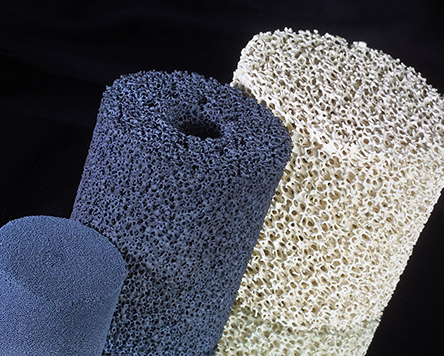Quick introduction: Foundry
To this day, the largest field of application for ceramic foams is metal melt filtration to produce high-quality castings and semi-finished products. The use of ceramic filters removes impurities such as slag residues, foundry sand and trapped gas bubbles. At the same time, a turbulence-free melt flow is formed, which leads to a very good mold filling and makes the production of particularly complex and thin-walled cast components possible.
The Fraunhofer IKTS develops formulations based on silicon carbide, aluminum oxide and zirconium oxide as well as manufacturing processes for these filters. The focus is on the one hand on highly filled coating suspensions with particularly good adhesive properties and on the other hand on various coating techniques such as rolling and centrifuging. The IKTS has a continuously operating, modular coating system that can be used to simulate industrial coating conditions. Thus, industrial foam-ceramic production can be simulated and optimally prepared.
With a newly developed recipe, the costs for zirconium oxide filters could be reduced by approx. 40 %. Previously, these were much more expensive than filters made of aluminum oxide and silicon carbide due to higher raw material prices. However, since they can be used at even higher temperatures, a reduction in costs can lead to a broader application. In the formulation of the reaction-bound foams developed at Fraunhofer IKTS, 65 % of the original zirconium oxide powder is replaced by a stoichiometric mixture of aluminum oxide and zirconium silicate. Compared to conventional zirconia filters, the new reaction-bound filters are thus not only less expensive but also have even higher strengths.
